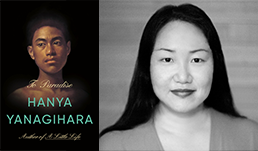- Categories:
A Q&A With Hanya Yanagihara, Author of January's Top Indie Next List Pick
- By Emily Behnke
Independent booksellers across the country have chosen Hanya Yanagihara’s To Paradise: A Novel (Doubleday) as their top pick for the January 2022 Indie Next List.

“Expansive, wholly original, and utterly engrossing,” said Christine Bollow of Loyalty Bookstore in Washington, DC. “To Paradise is a masterpiece. Fans of Yanagihara’s A Little Life will find themselves making a little more room in their hearts for this marvelous, emotional, and brilliant story.”
Here, Yanagihara discusses her process with Bookselling This Week.
Bookselling This Week: This book spans three alternate Americas in three different centuries. Where did you start? And what drew you to each year — 1893, 1993, and 2093?
Hanya Yanagihara: I knew I wanted to have three different Americas, each separated by a century, that would tell stories of different aspects of this country’s past, present, and future — ones lifted from history, and ones invented. The country’s actual colonial history threads through all three parts: 1893, when the first section begins, is the year that Queen Lili‘uokalani, Hawai’i’s last monarch, was overthrown.
BTW: What went into building these worlds? Did any section come more easily to you than the others?
HY: No, they all arrived simultaneously, and I had to figure out how they were related. Once I realized how they were connected, I was able to truly begin writing. This happened in early 2018.
BTW: What does your writing process look like?
HY: I have a full-time day job — I’m the editor in chief of T: The New York Times Style Magazine — so I write at night. I was much more disciplined with A Little Life: I wrote every night, for hours a night. With this book, I wrote most nights, but there’d be some nights, or even weeks, in which I did nothing. I don’t personally ascribe to the notion that you should write every day, but when you do have wind at your back, you should try to go for as long as you can. I write one draft and that’s the book. Of course, there are thousands of tweaks and changes and corrections that I make along the way, but I don’t do structural overhauls — I work it out before I actually start writing.
BTW: Each part of the book features the same grouping of names, with, perhaps, two of the most important being David Bingham and Charles Griffith. While the names are the same, the characters themselves aren’t. Why reuse names in this way?
HY: Names — and the desire to shed one’s own name — are important in all three of my books (something I didn’t realize until I was finished with this one). We all have the sense that we humans are who make the world we live in, but this book asks, subtly, what if the opposite were true? What if there are limited versions of us, humans, and the world is instead making us?
BTW: In a 2016 interview, you talked about structure being a challenge in A Little Life, and I imagine it was a challenge in To Paradise as well. How did you develop this structure?
HY: I don’t know. It just came to me. But once I had it, I had everything: how it would end, how the three sections would relate to one another, the leitmotifs that would carry from one section to the next, etc.
BTW: Infectious disease is at the center of your debut novel, The People in the Trees. And of course, the pandemic is something, on a global scale, we are all thinking about. But what made you want to write about it in the final section of To Paradise?
HY: I’m not sure — I’ve always been interested in disease. It certainly wasn’t from any oracular powers; I can tell you that much. I began interviewing virologists in 2017; one of them predicted that there’d be another big pandemic. But I didn’t think anything of it. And by the time we all went home from work in early March of 2020, I was so deep into the narrative of the third section that it felt completely separate from what was happening outside.
BTW: Did you feel you were taking a risk? There are two camps of people right now, I’ve noticed. Ones who want to read about pandemics and those who don’t. Is that — what people want to read — something you think about when you’re writing?
HY: Oh, how interesting. But the only people I’m thinking about when I’m writing is me—what do I want to read? — and my first reader, who’s also my dearest friend.
BTW: Have you thought about what you might want readers to take away from it?
HY: I want them to consider what America is, what it could be, how we might have seen it incorrectly, how we might see it more honestly, what it means to be a citizen of this country. I want them to leave with more questions — about what they’ll sacrifice for their personal sense of safety, about when love begins to shade into coercion, about what it means to be a member of society — than they had going in.
BTW: What role do independent bookstores play in your life?
HY: I would not be where I am as a writer were it not for the independent bookstores that stepped in to support me when even my own publishing house was still skeptical. My local, Three Lives & Company, was one of the first stores to be enthusiastic about A Little Life. It’s because of it, and so many other stores like Three Lives, that that novel found the readers it did. Indie booksellers are the most generous, passionate, sincere people you’ll encounter in the publishing industry. Thank you, booksellers: This is a real honor.

